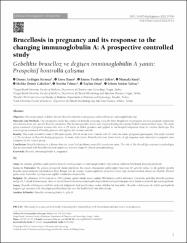Brucellosis in pregnancy and its response to the changing immunoglobulin A: A prospective controlled study

Göster/
Erişim
info:eu-repo/semantics/openAccessinfo:eu-repo/semantics/openAccessTarih
2022Yazar
Kırmızı, Demet AydoğanBaşer, Emre
Şölen, Emine Yeşilyurt
Kara, Mustafa
Çaltekin, Melike Demir
Yılmaz, Neziha
Onat, Taylan
Yalvaç, Ethem Serdar
Üst veri
Tüm öğe kaydını gösterKünye
Kırmızı, D. A., Başer, E., Şölen, E. Y., Kara, M., Çaltekin, M. D., Yılmaz, N., ... & Yalvaç, E. S. (2022). Brucellosis in pregnancy and its response to the changing immunoglobulin A: A prospective controlled study. Turkish Journal of Obstetrics and Gynecology, 19(1), 1.Özet
Objective: This study aimed to define the rare Brucella infection in pregnancy and its effects on immunoglobulins (Ig). Materials and Methods: This prospective study has conducted Brucella screening using the Rose Bengal test on pregnant and non-pregnant outpatients who did not show any specific Brucella symptoms. The immunoglobulin levels were measured using the enzyme-linked immunosorbent assay. The study group consisted of pregnant women who were at 20 weeks or below gestation and applied to our hospital outpatient clinic for routine check-ups. The control group consisted of healthy patients who applied for routine controls. Results: This study included a total of 584 participants, 293 of whom were controls and 291 were the study (pregnant) participants. The study revealed a 1.5% incidence of Brucella during pregnancy. In acute and chronic Brucella infection, lower levels of IgA response were observed in pregnant cases compared to the control group. Conclusion: Brucella infection is a disease that can cause fetal problems, especially in endemic areas. The role of the altered IgA response in pathologies that are associated with Brucella infection stands out as a new target for disease pathophysiology. Objective: This study aimed to define the rare Brucella infection in pregnancy and its effects on immunoglobulins (Ig). Materials and Methods: This prospective study has conducted Brucella screening using the Rose Bengal test on pregnant and non-pregnant outpatients who did not show any specific Brucella symptoms. The immunoglobulin levels were measured using the enzyme-linked immunosorbent assay. The study group consisted of pregnant women who were at 20 weeks or below gestation and applied to our hospital outpatient clinic for routine check-ups. The control group consisted of healthy patients who applied for routine controls. Results: This study included a total of 584 participants, 293 of whom were controls and 291 were the study (pregnant) participants. The study revealed a 1.5% incidence of Brucella during pregnancy. In acute and chronic Brucella infection, lower levels of IgA response were observed in pregnant cases compared to the control group. Conclusion: Brucella infection is a disease that can cause fetal problems, especially in endemic areas. The role of the altered IgA response in pathologies that are associated with Brucella infection stands out as a new target for disease pathophysiology.

















